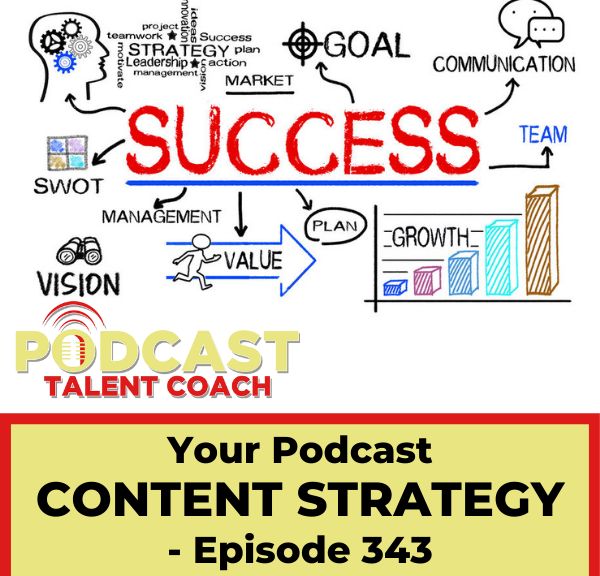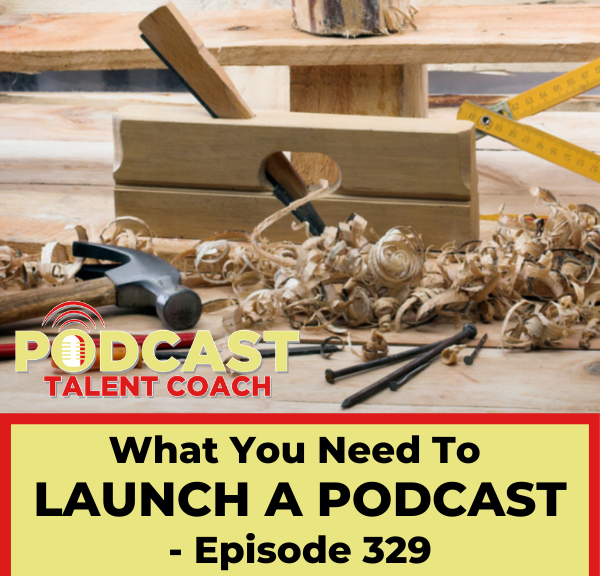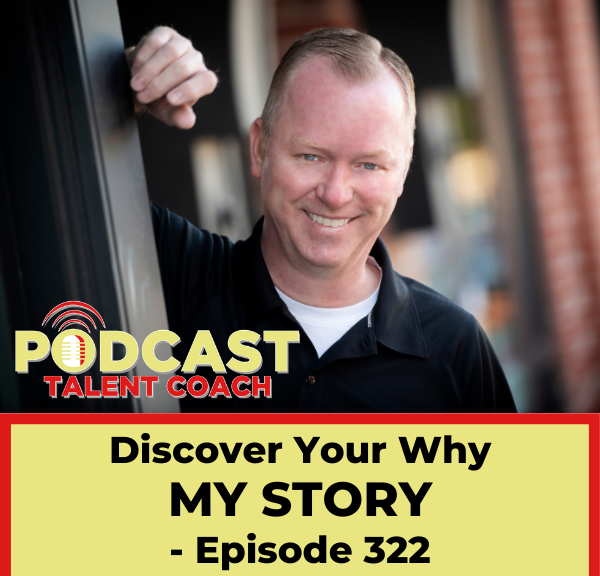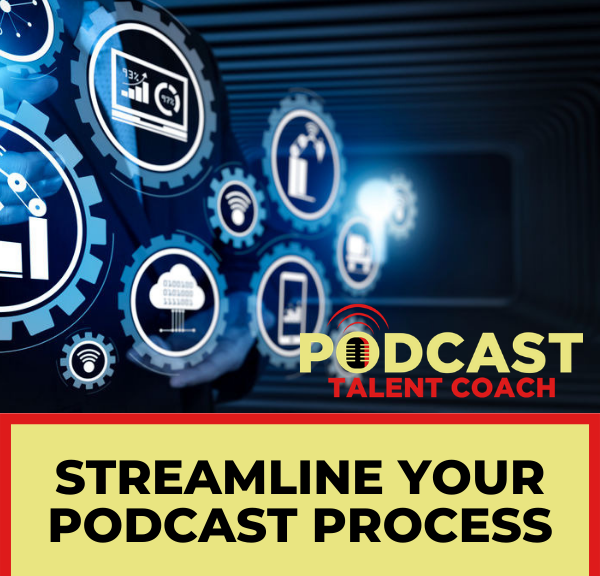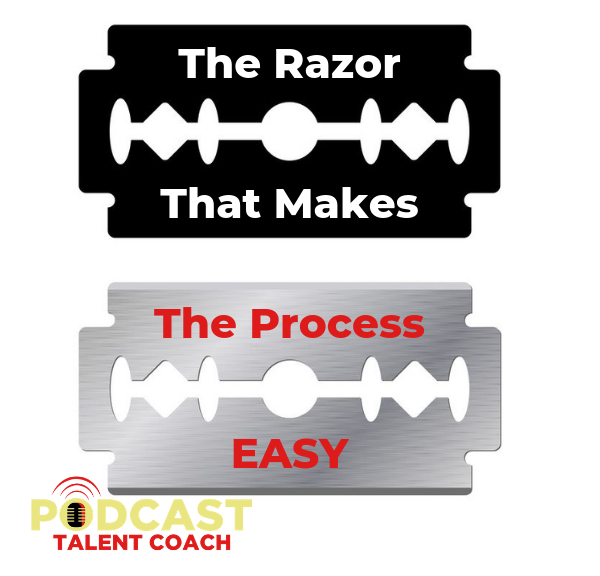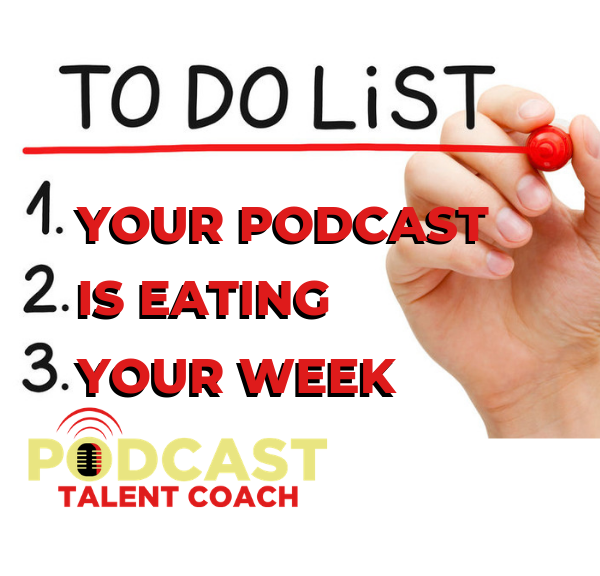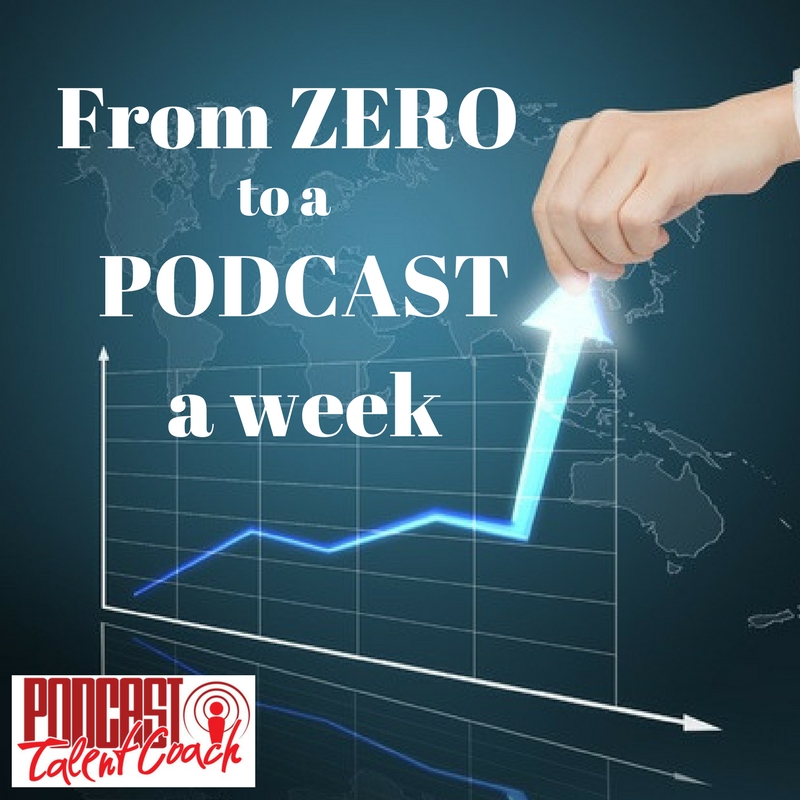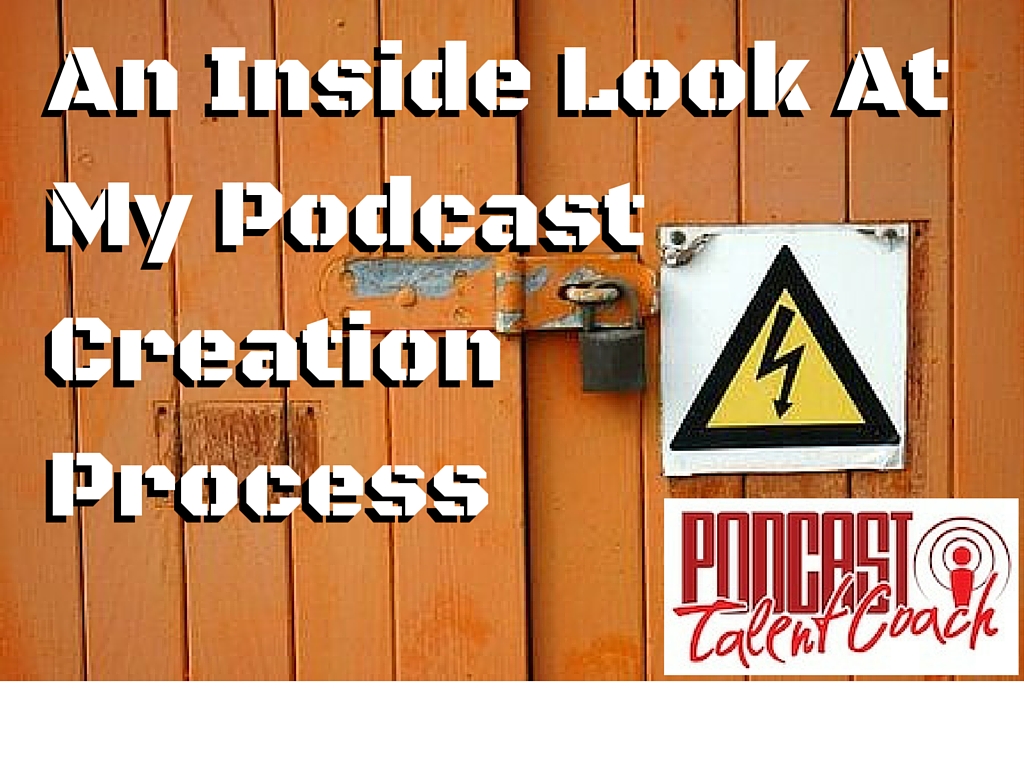Podcast: Play in new window | Download
Subscribe:
Launching a podcast doesn’t need to be difficult. Many gurus make you think it takes a lot of technical knowledge and magic powder. Today, I am going to show you how easy it can be to launch your podcast.
Even if you have a podcast, you’ll find some tips here today that will make it even easier for you to succeed.
CHALLENGES
Let’s start with the challenges. There are 3 big challenges that coaches face as they try to build their podcast and audience.
– The first is making it more complicated than it needs to be.
– They don’t have a roadmap
– They don’t know where to start
Let’s take these one at a time.
KEEP IT SIMPLE
Don’t make it complicated. You don’t need to be a tech guru to create a podcast.
Start by recording your episode in audio software. Then, edit it. Editing a podcast is like editing a word document. Highlight and delete. If you need help here, go to www.PodcastTalentCoach.com/editing.
Next, export the file as an .mp3. This is just like saving a document as a .pdf. Click “file” and “export”. Some audio software has an export button that makes it really easy.
You then upload your file to your audio host, such as Libsyn. This is just like uploading a photo to Facebook. Your audio host stores your audio. You can get a free month by using the code PTC at www.Libsyn.com.
Embed the audio player and episode on your website. Just copy and paste the code.
Finally, be sure your show is linked to Apple Podcasts and the others. This involves coping the address from your audio host and pasting it on the platform. You only need to do this once.
That’s it. You have a podcast.
Now, producing your podcast is just one of the 6 parts. Most gurus will teach you maybe 2 parts. You need all 6 for a successful podcast. I’ll show you those in a bit.
SPENDING MONEY
You also don’t need to spend a ton of money to podcast.
The #1 mistake most people make when they are launching is spending way too much on equipment and making it more complicated than is necessary. You don’t need a professional studio.
Start with a few inexpensive pieces of gear. You probably already have a computer available.
You need a decent USB microphone that you can plug right into your computer. That will cost you about $75.
You need some headphones. You probably already have a pair of earbuds laying around your home.
Get some editing software. You can get Audacity for free on the internet or use Garage Band on your Mac. I really like Hindenburg Journalist. That will cost you about $100.
If you are going to do interviews, you can record those using free resources like Zoom, Skype or something similar.
Can you spend more? Sure, but why? Don’t complicate it with a mixer and bunch of cables. Don’t go spend $300 on a mic. Just get started.
ROADMAP
Next, many podcasters don’t have a roadmap for success.
One secret most gurus don’t tell you is that getting listeners isn’t enough. You need to develop a plan to keep them listening.
Many podcast gurus teach you how to create a podcast. Record your interview. Convert it to an .mp3. Upload it to your host. You have a podcast. Now what?
Some may even teach you how to get a few listeners. But, that is where most people teaching podcast stop.
The problem is … if you keep putting water in a bucket with holes in the bottom, it becomes very difficult to increase the amount of water in the bucket.
The same is true with your podcast. If you keep adding listeners, but they don’t stick around, your audience and authority won’t grow.
If you want to use a podcast to grow your business and authority, you need to build it on a solid foundation and strategy.
STRATEGY
Earlier I told you there were 6 steps to a successful podcast.
My Podcast Fast Blueprint teaches you all 6 steps. Those steps are Purpose, Program, Platform, Produce, Promote and Profit.
Producing your show is only one piece.
Your purpose is your why. Without a solid why, you won’t stick with it. Creating a podcast every week will soon seem like a chore.
Find your inspiration with a strong why.
Your program is your niche. This is what you will talk about. It better be something you love and can talk about for hours. This makes creating content so much easier.
Your platform is the format of your show. Will your show be solo, interview, magazine, documentary, two-person or some other format?
We’ve talked about producing. Record, edit, export, post.
Promote is all about attracting your listeners. This is how you bring fans to your show and keep them listening.
Finally, profit from your efforts. Money doesn’t fall from the sky. You need to build an audience and have a strategy.
Six steps. It doesn’t need to be any harder than that.
WHERE TO START
The third challenge many would-be podcasters face is that they don’t know where to start. Let me show you.
What would it mean to your business if you had an easy way to connect to the big fish that were your ideal clients? You could serve them and help them by inviting them on your show and nurture the relationship. Another powerful way to attract your ideal clients.
Let’s talk about using a podcast to drive your business. You have been trying to find unique ways to reach your potential clients. Over the last few minutes we’ve been together, I hope you have written down a few ideas how you might incorporate a podcast into your marketing plan.
How great would it be to be able to talk directly to your ideal client every week and have them request it? They actually subscribe to hear you demonstrate your authority in the space.
You have the steps that can help you. By now, you know how I communicate. You know how I teach. Let’s figure out what you are doing right and find ways to do more of that.
Here’s what I know. If you want another level of success in your business, you’re gonna need help. There’s no way to get different results by doing the same thing. There’s no way you’re gonna get to another level on your own. You need help, and I’d like to be that help.
YOUR OPPORTUNITY
That’s why I am so excited to offer you this opportunity to get into my Podcast Fast Blueprint launch program. This will help you get your podcast launched in 30 days or less.
Launching a podcast is much easier than you think if you know the roadmap. It takes a lot less time than you can imagine. And, it is much more effective than other content methods at attracting and creating powerful relationships with your ideal clients.
So, let me offer you some help. What would it mean if you were able to get in front of your ideal clients each and every week? Not only that, but your ideal clients actually subscribe and ask to hear from you every week?
This is like a weekly webinar with a built-in audience. What would that do to your coaching business? That is the power of a podcast.
How quickly could you grow your influence and authority in your niche if you were talking to and teaching your potential clients each and every week? That is the power of a podcast.
How would you like me to help you launch a podcast of your own in 30 days? I will walk you through the process step-by-step.
I have a coaching program where I will walk your through the entire process. You will have your podcast launched in 30 days if you do the work consistently. No guessing. I will lay it out for you. You simply need to take the action.
It is called the Podcast Fast Blueprint. And classes are getting ready to start. I’d love to have you join us.
WHAT YOU GET
The coaching includes six weekly group calls with me to teach you the process, to ensure you are taking the right steps and to get all of your questions answered.
This program will give you access to the Podcast Fast Blueprint online portal that will include the recorded calls and plenty of resources that will show you the steps and walk you through the podcast launch checklist. We will record video of the calls and put them inside of the member area, so you can access them again when you need them.
You will also be able to download audio recording of the calls, so you can take them with you and listen on your time. This is just like a private podcast of the teachings. Listen to them whenever you’d like at your convenience.
On top of the 6 weekly calls, you will get the step-by-step Podcast Fast Blueprint to build a successful podcast that not only demonstrates your authority, but attracts clients as well. This process is laid out in the Podcast Talent Coach worksheets that took me 30 years in radio and podcasting to learn, develop and perfect.
This formula is inside of the Podcast Fast Blueprint modules that walk you through creating your content and connecting to your ideal clients. You will learn all of the things necessary to launch in 30 days and start attracting clients.
You will also get lifetime access to our closed group where you can share ideas, get additional support and ask any other questions you might have. Most importantly, you get a system you can follow to launch in 30 days.
In order to ensure you get the attention you need and deserve, I will also give you a personal one-on-one call at the end of the program to develop your audience growth plan after you have launched.
THE VALUE
Total value of this program is thousands and thousand of dollars. But your tuition isn’t nearly that.
People usually pay $1,500 for just the process itself without the recordings, support group, and all of the other components. You won’t pay that either.
You can get full details at www.PodcastTalentCoach.com/start. I’m not giving the price here, because it could change at any time. This podcast will be around for years. You can see the current structure, bonuses, and price and find the enrollment link at www.PodcastTalentCoach.com/Start.
If you don’t have a mentor who can take your hand and walk you through the entire process to launching your podcast in 30 days or less, you owe it to yourself to check this out. Stop suffering through the trial and error. Stop beating yourself up with “someday”. Make that “someday” today.
Of course there is a guarantee. In fact, there are two guarantee. First, if you take action and do the work, and you are not launched in 30 days, I will coach you for free until you have your podcast launched.
And, I’ll give you a 30-day money back guarantee. If you get into it and within the first 30 days you realize this isn’t for you, I’ll give you your money back with no questions. What do you have to lose?
WHAT WOULD IT MEAN?
Just think, what would it mean to your business if you could get in front of your clients each and every week? Not only that, but your ideal clients actually subscribe and ask to hear from you every week? This is like a weekly webinar with subscribers and a built-in audience.
What would that do to your influence and authority? Podcasting could double in the next 5 years. 90 million people in the U.S. alone have listened to a podcast in the past month, and it is only getting bigger. Now is the time to start.
Come check out the program and get enrolled. Make today your day. Visit www.PodcastTalentCoach.com/Start.
When you join today, you will get instant access to the entire content in the portal. Plus, you will get all of the templates and documents you need to launch your podcast.
THE MODULES
You can start studying today. You can begin in module one by defining your show focus and developing your ideal client.
Each step has homework that you will submit in the private group for feedback.
As we go through this journey, you will begin creating your podcast step-by-step one step at a time. Module 2 will show you how to structure you show, prepare for each episode and how to interview.
Then, module 3 will teach you improve your show and process.
Module 4 shows you how to use your content to attract your clients and so on. You will have your podcast launched in 30 days.
We will begin the live calls soon. So, right now when you take action and join the program, you can get started and be on the path to launch your show in 30 days.
You’ve been saying, “One day I’ll launch my podcast.” One day is just a pipe dream unless you set a deadline and take action.
Here is your chance to launch your show in 30 days. Join the program to today and make today your “one day”.
Make a big impact in your business and in your life. Begin growing your authority and demonstrating your expertise.
Get enrolled at www.PodcastTalentCoach.com/Start.
I am excited to work with you. Be sure to take advantage of the exclusive offer today and check out the bonuses.
Let’s get you launched in the next 30 days. I can’t wait to help you launch. Get the details at www.PodcastTalentCoach.com/start.
I’ll see you in the program.
Do you need help with your podcast? E-mail me any time at Coach@PodcastTalentCoach.com. Let’s see what we can do.
Let’s turn your information into engaging entertainment.
